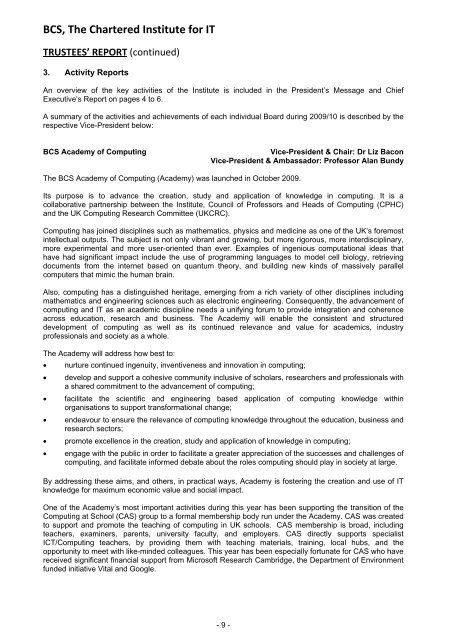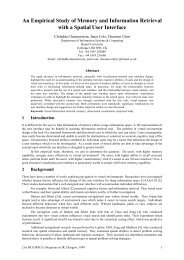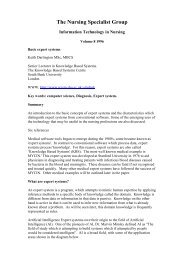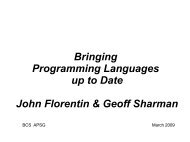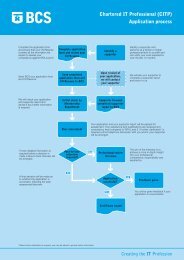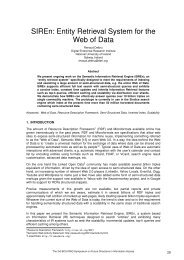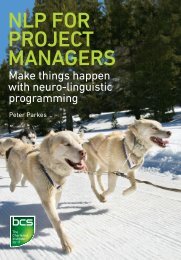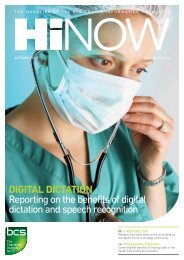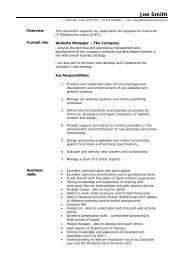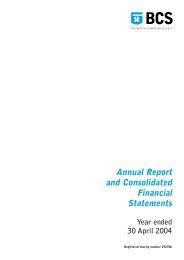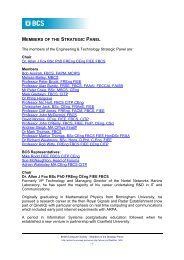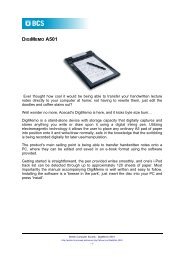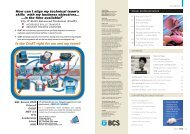BCS, The Chartered Institute for IT Annual Report and Consolidated ...
BCS, The Chartered Institute for IT Annual Report and Consolidated ...
BCS, The Chartered Institute for IT Annual Report and Consolidated ...
You also want an ePaper? Increase the reach of your titles
YUMPU automatically turns print PDFs into web optimized ePapers that Google loves.
<strong>BCS</strong>, <strong>The</strong> <strong>Chartered</strong> <strong>Institute</strong> <strong>for</strong> <strong>IT</strong><br />
TRUSTEES’ REPORT (continued)<br />
3. Activity <strong>Report</strong>s<br />
An overview of the key activities of the <strong>Institute</strong> is included in the President’s Message <strong>and</strong> Chief<br />
Executive’s <strong>Report</strong> on pages 4 to 6.<br />
A summary of the activities <strong>and</strong> achievements of each individual Board during 2009/10 is described by the<br />
respective Vice-President below:<br />
<strong>BCS</strong> Academy of Computing Vice-President & Chair: Dr Liz Bacon<br />
Vice-President & Ambassador: Professor Alan Bundy<br />
<strong>The</strong> <strong>BCS</strong> Academy of Computing (Academy) was launched in October 2009.<br />
Its purpose is to advance the creation, study <strong>and</strong> application of knowledge in computing. It is a<br />
collaborative partnership between the <strong>Institute</strong>, Council of Professors <strong>and</strong> Heads of Computing (CPHC)<br />
<strong>and</strong> the UK Computing Research Committee (UKCRC).<br />
Computing has joined disciplines such as mathematics, physics <strong>and</strong> medicine as one of the UK’s <strong>for</strong>emost<br />
intellectual outputs. <strong>The</strong> subject is not only vibrant <strong>and</strong> growing, but more rigorous, more interdisciplinary,<br />
more experimental <strong>and</strong> more user-oriented than ever. Examples of ingenious computational ideas that<br />
have had significant impact include the use of programming languages to model cell biology, retrieving<br />
documents from the internet based on quantum theory, <strong>and</strong> building new kinds of massively parallel<br />
computers that mimic the human brain.<br />
Also, computing has a distinguished heritage, emerging from a rich variety of other disciplines including<br />
mathematics <strong>and</strong> engineering sciences such as electronic engineering. Consequently, the advancement of<br />
computing <strong>and</strong> <strong>IT</strong> as an academic discipline needs a unifying <strong>for</strong>um to provide integration <strong>and</strong> coherence<br />
across education, research <strong>and</strong> business. <strong>The</strong> Academy will enable the consistent <strong>and</strong> structured<br />
development of computing as well as its continued relevance <strong>and</strong> value <strong>for</strong> academics, industry<br />
professionals <strong>and</strong> society as a whole.<br />
<strong>The</strong> Academy will address how best to:<br />
� nurture continued ingenuity, inventiveness <strong>and</strong> innovation in computing;<br />
� develop <strong>and</strong> support a cohesive community inclusive of scholars, researchers <strong>and</strong> professionals with<br />
a shared commitment to the advancement of computing;<br />
� facilitate the scientific <strong>and</strong> engineering based application of computing knowledge within<br />
organisations to support trans<strong>for</strong>mational change;<br />
� endeavour to ensure the relevance of computing knowledge throughout the education, business <strong>and</strong><br />
research sectors;<br />
� promote excellence in the creation, study <strong>and</strong> application of knowledge in computing;<br />
� engage with the public in order to facilitate a greater appreciation of the successes <strong>and</strong> challenges of<br />
computing, <strong>and</strong> facilitate in<strong>for</strong>med debate about the roles computing should play in society at large.<br />
By addressing these aims, <strong>and</strong> others, in practical ways, Academy is fostering the creation <strong>and</strong> use of <strong>IT</strong><br />
knowledge <strong>for</strong> maximum economic value <strong>and</strong> social impact.<br />
One of the Academy’s most important activities during this year has been supporting the transition of the<br />
Computing at School (CAS) group to a <strong>for</strong>mal membership body run under the Academy. CAS was created<br />
to support <strong>and</strong> promote the teaching of computing in UK schools. CAS membership is broad, including<br />
teachers, examiners, parents, university faculty, <strong>and</strong> employers. CAS directly supports specialist<br />
ICT/Computing teachers, by providing them with teaching materials, training, local hubs, <strong>and</strong> the<br />
opportunity to meet with like-minded colleagues. This year has been especially <strong>for</strong>tunate <strong>for</strong> CAS who have<br />
received significant financial support from Microsoft Research Cambridge, the Department of Environment<br />
funded initiative Vital <strong>and</strong> Google.<br />
- 9 -


